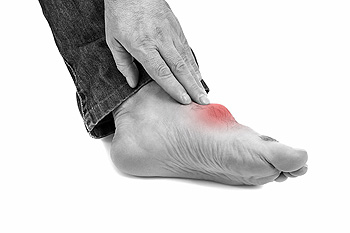


 Gout is a type of inflammatory arthritis that occurs when too much uric acid is found in the blood. When this uric acid progressively builds up, crystals form that attach to the joints and lead to pain, often felt in the foot or ankle region. This pain may also come in spurts, which is typically referred to as gout attacks. Redness and swelling of the feet, along with pain, and feeling slightly feverish, are all symptoms you may experience if you have developed gout. Because this condition can be incredibly painful, it’s recommended that you seek the care of a podiatrist who will be able to properly diagnose your condition, as well as offer you a means to alleviate your discomfort.
Gout is a type of inflammatory arthritis that occurs when too much uric acid is found in the blood. When this uric acid progressively builds up, crystals form that attach to the joints and lead to pain, often felt in the foot or ankle region. This pain may also come in spurts, which is typically referred to as gout attacks. Redness and swelling of the feet, along with pain, and feeling slightly feverish, are all symptoms you may experience if you have developed gout. Because this condition can be incredibly painful, it’s recommended that you seek the care of a podiatrist who will be able to properly diagnose your condition, as well as offer you a means to alleviate your discomfort.
Gout is a foot condition that requires certain treatment and care. If you are seeking treatment, contact our podiatrist from Dr. Powers Foot and Ankle. Our doctor will treat your foot and ankle needs.
What Is Gout?
Gout is a type of arthritis caused by a buildup of uric acid in the bloodstream. It often develops in the foot, especially the big toe area, although it can manifest in other parts of the body as well. Gout can make walking and standing very painful and is especially common in diabetics and the obese.
People typically get gout because of a poor diet. Genetic predisposition is also a factor. The children of parents who have had gout frequently have a chance of developing it themselves.
Gout can easily be identified by redness and inflammation of the big toe and the surrounding areas of the foot. Other symptoms include extreme fatigue, joint pain, and running high fevers. Sometimes corticosteroid drugs can be prescribed to treat gout, but the best way to combat this disease is to get more exercise and eat a better diet.
If you have any questions please feel free to contact one of our offices located in Bloomington, Bedford, and Washington, IN . We offer the newest diagnostic and treatment technologies for all your foot and ankle needs.